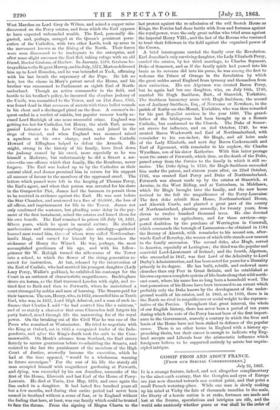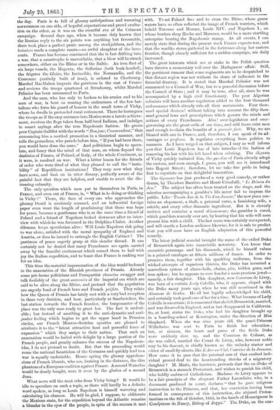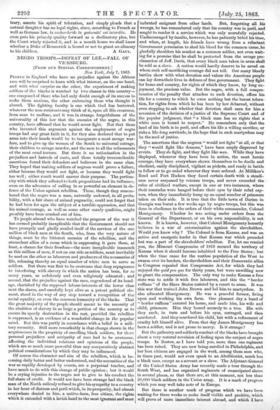GOSSIP FROM AND ABOUT FRANCE. [Fsom OUR SPECIAL CORRESPONDENT.] July
23, 1863. IT is a strange feature, indeed, and not altogether complimentary to the nineteenth century, that the thoughts and eyes of Europe are just now directed towards one central point, and that point a small French watering-place. While one man is slowly making up his mind at Vichy the fate of thousands trembles in the scale, the liberty of a heroic nation is at stake, fortunes are made and lost at the Bourse, speculations and intrigues are rife, and the world asks anxiously whether peace or war shall be the order of the day. Paris is as full of gloomy anticipations and wavering nervousness on one side, of hopeful expectations and proud exulta- tion on the other, as it was on the eventful eve of the Crimean campaign. Several days ago, when it became duly known that the Russian reply to the six points was anything but favourable, there took place a perfect panic among the stockjobbers, and the baissiers made a complete razzia—an awful slaughter of the inno- cents. France has become convinced that she is fast drifting into a war, that a catastrophe is unavoidable, that a blow will be struck somewhere, either on the Rhine or in the Baltic. An iron fleet of six large vessels, the Magenta, the Solferino (both beak-headed), the frigates the Gloire, the Invincible, the Normandie, and the Couranne (entirely built of iron), is ordered to Cherbourg. Marshal MacMahon inspects the garrisons in the east of France and reviews the troops quartered at Strasbourg, whilst Marshal Pelissier has been summoned to Paris.
And the man, who has only to beckon to his armies and to his men of war, is bent on rousing the enthusiasm of the few bat- talions who form his guard of honour in the small town of Vichy, where he dwells in pretended rural retirement. There he harangues the troops as if the easy entrance into Mexico were a heroic achieve- ment, receives the flags taken from half-bred Indians, and indulges in smart sayings after the true Napoleonic fashion. He greets poor Captain Gallifet with the words "Bonjour, Commandant," thus announcing him a merited promotion in a theatrical manner, and tells the grenadiers, who parade before him, " If you had been there, you would have done the same." And politicians begin to specu- late, and fancy that the mind of that man, on whom depend the destinies of France, of Poland, of Italy, of the whole Continent, as it were, is resolved on war. What a bitter lesson for the friends of order who were tired of what they pleased to call the "insta- bility" of Republican institutions! They reap now what they have sown, and look on in utter dismay, perfectly aware of the painful fact that they are helpless, and unable to avert the dis- tressing calamity.
The only question which men put to themselves in Paris, in France, and even out of France, is, "What is he doing or thinking in Vichy ?" There, the face of every one who approaches the gloomy Druid is anxiously scanned, and an influential foreign paper even went the length of proclaiming that there was hope for peace, because a gentleman who is at the same time a friend of Poland and a friend of Napoleon looked downcast after an inter- view with which he was favoured in the Delphian Chalet. Another dilemma keeps speculation alive : Will Louis Napoleon risk going to war alone, satisfied with the moral sympathy of England and Austria, or does he intend to entangle the English Cabinet ? The partizans of peace eagerly grasp at this slender thread. It can certainly not be denied that many Frenchmen are again carried away by the fanciful excitement which caused them to hail with joy the Italian expedition, and to boast that France is making war for an idea.
This time the material impersonation of the idea would be found in the annexation of the Rhenish provinces of Prussia. Already some pot-house politicians and Bonapartist chauvins swagger and talk foolishly of the great souvenirs of the Imperial era which are said to be alive along the Rhine, and pretend that the population are eagerly fond of French laws and French p7Vets. They relate how the Queen of Prussia has lately met with a very bad reception in these very districts, and how, particularly at Saarbriicken, the last station towards the French frontier, the burgomaster of the place was the only man ready to greet her. The fact is undeni- able; but instead of ascribing it to the anti-dynastic and anti- junker feeling which begins to get the upper hand in Prussian circles, our French Monroe-doctrine apostles are pleased to attribute it to the "latent attractive heat and powerful force of expansion" which they assign to their nation. That such an annexation would be hailed with delight by a large portion of the French people, and greatly enhance the success of the Napoleon- ides, I do not pretend to doubt. But that the proceeding would rouse the national fanaticism of the Germans and quickly lead to a war is equally undeniable. Hence spring the gloomy apprehen- sions of French liberals, who see, looming in the distance, the dire phantom of a European coalition against France. A second Waterloo would be dearly bought, were it even by the glories of a second Jena.
What news will the nest echo from Vichy bring? It would be idle to speculate on such a topic, as there will hardly be a definite word spoken, as long as Louis Napoleon is himself wavering and calculating his chances. He will be glad, I suppose, to obliterate the Mexican stain, for the expedition beyond the Atlantic remains a blunder in the eyes of the people, in spite of the success it met
with. To set Poland free and to cross the Rhine, whose green waters have so often reflected the image of French warriors, which beheld Turenne and Moreau, Louis XIV. and Napoleon I., on whose borders sleep Hoche and Marceau, would be a more startling enterprise bearing the Napoleonic stamp. At all events, I can merely state that during the present week France expects war, and that the warlike stores gathered in the fortresses along her eastern frontier, though already sufficient for a sudden campaign, are daily increased.
The great interests which are at stake in the Polish question have thrown a momentary veil over the Madagascar affair. Still, the persistent rumour that some regiments are to be despatched to that distant region was not without its share of influence in the financial disarray. It is stated that Marshal Pelissier was not summoned to a Council of War, but to a peaceful discussion before the Council of State ; and it may be true, after all, since he was accompanied by a high civil functionary. The poor Algerian colonists will have another regulation added to the four thousand ordonnances which already rule all their movements. Four thou- sand special decrees ! without taking into account the fifty thou- sand general laws and prescriptions which govern the minds and actions of every Frenchman. Alas ! over-legislation and over- governing are the great evils of our time, and still there exist men mad enough to claim the benefits of a pouvoir fort. Why, we are blessed with one in France, and, therefore, I can speak of its ad- vantages ex profess°. It regulates everything from politics to manners. As I have verged on that subject, I may as well inform you that Louis Napoleon has of late introduced the fashion of removing his hat with his left hand when saluting. The elegant, of Vichy quickly imitated him, the gandins of Paris already adopt the custom, and soon enough, I guess, you will see it introduced into Regent Street ; therefore, let me take due pride in being first to expatiate on that delightful innovation.
The Gymnase has just produced a very good comedy, or rather drama, by Thdodore Barriere and Henri Crisafulli, "Le Demon du feu." The subject has often been treated on the stage, and the miseries accompanying a gambler's life never fail to impress the public. Like "Trente Ans de la Vie dun Joueur," the new piece con- tains an elopement, a theft, a paternal curse, a famishing wife, a suicide, and every other dramatic ingredient. But it is cleverly written and contains a novel denouement; the gambler is cured, which gamblers scarcely ever are, by hearing that his wife will soon present him with a child. The last scene was certainly unexpected, and will startle a London audience likewise, for it is safe to predict that you will soon have an English adaptation of this powerful comedy.
The latest judicial scandal brought the name of the exiled Duke of Brunswick again into unenviable notoriety. You know that eccentric personage and his diamonds, which he himself values in a printed catalogue at fifteen millions of francs. In order to preserve them, together with his sparkling uniforms, from the wicked attempts of rapacious thieves, the Duke has invented a marvellous system of alarm-bells, chains, pits, hidden guns, and iron spikes ; but he appears to care less for a more precious jewel— namely, a fair daughter. This daughter, now Countess de Livry, was born of a certain Lady Colville, who, it appears, eloped with the Duke many years ago, when he was still mentioned in the Almanac de Gotha. He all but legally acknowledged his child, and certainly took good care of her for a time. What became of Lady Colville is uncertain; it is rumoured that she left Brunswick, married, and was divorced in England, and at last disappeared in California. So, at least, states the Duke, who had his daughter brought up in a boarding-school at Kensington, under the direction of Miss Shepherd. When she was nine years old, the quasi-Princess Wilhelmiue was sent to Paris to finish her education ; but, at sixteen, the heart and purse of the fickle Duke were suddenly shut up, and the Countess de Colmar, as she was called, married the Count de Livry, who, however noble may be his descent, is chiefly known as the unlucky starter and editor of small fly-sheets, like L'Arc-en-Ciel, Courrier de la Jeunesse. How came it to pass that the paternal ears of that exalted indi- vidual proved deaf to the heartrending shrieks of a migratory daughter? M. Marie, the barrister, pretends that the ex-Duke of Brunswick is a staunch Protestant, and wishes to punish his child, who boldly embraced Catholicism. Madame de Livry appears to be a fair proselyte of the eloquent Father Laeordaire, who, in a document produced in court, declares "that he gave religious instruction to the Princess, and that, her conviction having been formed in consequence of this instruction, she abjured Protes- tantism on the 8th of October, 1848, in the hands of Monseigneur le Coadjuteur de Nancy, Bishop of Joppe." The Duke, on the con- trary, asserts his spirit of toleration, and simply pleads that a natural daughter has no legal rights, since, according to French as well as German law, is recherehede la paternite est interdite. He even puts his princely quality forward as a declinatory plea, but the Court wisely rejected it, and in a month hence we shall know whether a Duke of Brunswick is bound or not to grant an alimony
































 Previous page
Previous page